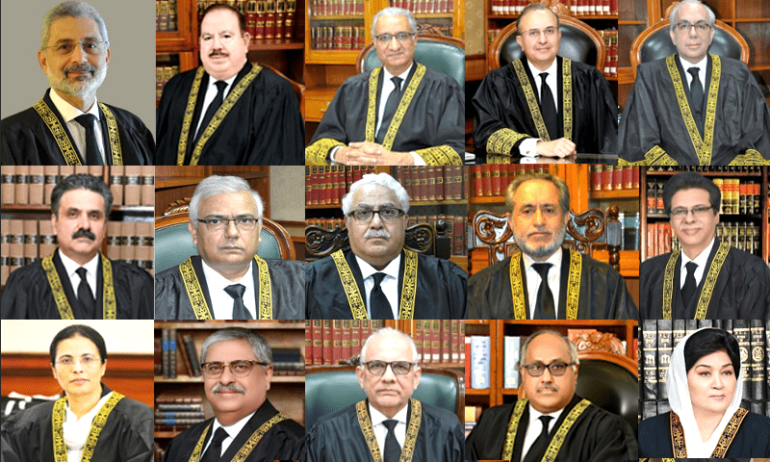Newly-appointed Chief Justice of Pakistan (CJP) Faez Isa while presiding over a full-court on a set of petitions challenging the SC (Practice and Procedure) Act 2023 on Monday expressed his reluctance to possess ‘absolute authority’ as top judge of the country.
During the hearing which was first-ever live telecast of the apex court’s proceedings, the CJP observed that as top judge of the country, he did not want absolute authority.
“Rs6.5 billion dollars were lost due to the court’s decision in the Reko Diq case, As chief justice, I do not want such authority,” the CJP remarked while recalling the oath taken by him to uphold the law and the Constitution.
The historic full court hearing on petitions challenging the SC (Practice and Procedure) Act 2023 was adjourned till October 3. The contentious law seeks to regulate suo motu powers of the country’s top judge.
During the hearing, CJP Faez Isa announced that arguments in the case would commence anew due to the formation of a new bench. This development came after three applications for a full-court hearing were approved.
Attorney General for Pakistan (AGP) Mansoor Usman Awan submitted the federal government’s response, urging the court to dismiss the petitions against the Supreme Court Practice and Procedure Act.
It’s worth noting that on April 13, an eight-member bench of the Supreme Court, led by then-CJP Umar Ata Bandial, halted the implementation of the aforementioned law.
A day earlier, the full court was constituted by the newly-appointed CJP and included Justice Sardar Tariq Masood, Justice Ijazul Ahsan, Justice Syed Mansoor Ali Shah, Justice Munib Akhtar, Justice Yahya Afridi, Justice Aminuddin Khan, Justice Sayyed Mazahar Ali Akbar Naqvi, Justice Jamal Khan Mandokhel, Justice Muhammad Ali Mazhar, Justice Ayesha A Malik, Justice Athar Minallah, Justice Syed Hasan Azhar Rizvi, Justice Shahid Waheed and Justice Musarrat Hilali.
At the commencement of the hearing, the Chief Justice of Pakistan (CJP) pointed out that there were nine applications for full court and requested Advocate Khawaja Tariq Rahim to initiate his arguments.
The CJP asked counsel Rahim to focus on reading the Act and to set aside any past considerations.
Referring to the practice Act, Rahim mentioned that Parliament had formed a committee of three judges to decide on matters of public interest. Justice Mandokhail interjected by asking about the content of Article 191 of the Constitution.
Khawaja explained that the Constitution empowers Parliament to legislate and mentioned that the apex court had established its rules through the full court.
Justice Musrat raised a question about whether legislation could nullify the powers of the Chief Justice, prompting Justice Mandokhail to inquire whether the legislation aimed to abolish the powers of the Chief Justice or the Supreme Court.
Justice Athar questioned whether it was acceptable for the Chief Justice to have unlimited power to form a bench. Both CJP Isa and Justice Mazhar asked Rahim to specify which section of the law the petitioner objected to and which article of the Constitution the Act was in conflict with.
With numerous pertinent questions regarding the power and authority of Parliament, the CJP reminded Rahim to take note of these questions and respond to them later. He encouraged the lawyer to take his time in providing answers, acknowledging the quality of the questions posed by his colleagues.
Furthermore, the CJP reprimanded counsel Rahim for introducing his “personal opinion” during the arguments and urged him to focus on discussing the law. He questioned whose rights could be affected by this law.
Rahim argued that Parliament had “interfered” with the rules of the Supreme Court. Justice Athar questioned whether he supported the events of the past.
During the hearing, the CJP asked Rahim to clarify whether he believed the entire law was flawed or just certain clauses. Rahim responded by citing Schedule 4 of the Federal Legislative List, indicating that the Supreme Court had the authority to establish its rules of practice and procedure.
Justice Mandokhel asked whether this authority was granted to the Supreme Court in the Constitution or through legislation, to which Rahim deferred his response to a later time.
Justice Athar inquired whether it was not within Parliament’s jurisdiction to enact this law.
The CJP remarked during the hearing that the court operated using the taxpayers’ money. He noted that if this law were invalidated, it would benefit the Chief Justice but emphasized that judges take an oath to uphold the Constitution and the law. He expressed his reluctance as the top judge of the country to possess absolute authority, citing a significant financial loss incurred due to a court decision in the Reko Diq case. He stated that as Chief Justice, he did not desire such authority and stressed that his oath was to uphold the law and the Constitution.
After a brief hiatus, Attorney General Mansoor Usman Awan appeared before the court and argued that the petitions were inadmissible.
He said that the law dealt with the powers of one office, not the entire judiciary, and aimed to bring “democratic transparency” to the institution.
He further contended that the law au contraire to the claims of the petitioners actually served in the public interest.
The AGP further argued that since no external check or institution was involved or imposed by the Act, it did not, in fact, curtail the power of the institution as a whole.
During the hearing, CJP Isa asked AGP Awan whether he was liable to follow the 1980 rules of the Supreme Court.
“Rules are there to guide us not to limit us,” the top judge observed.
However, Justice Akhtar said that the judges are not bound by the SC Rules, adding that in such a situation how can the Supreme Court judges be bound by the Act being challenged in the court?
Following this, CJP Isa announced that they were taking a “short break” and would resume hearing of the case.
However, as the judges were leaving the courtroom PTI’s lawyer Aziz Bhandari came to the rostrum.
Justice Isa, while addressing Bhandari, asked, “Whose lawyer are you?” He replied, “PTI’s”. The top judge then assured him that they would listen to his arguments after recess.
When the hearing resumed after the short break, the chief justice asked Advocate Rahim how long he would take to complete his arguments. Rahim said he would complete his arguments in two days.
When asked the same question to Bhandari, the PTI’s counsel said that he would take just half an hour. While Zaman Khan Vardag was of the view that he would submit his written arguments.
“It does not seem the hearing will be completed by today,” the CJP observed.
Keeping the stay order effective on the law clipping the chief justice’s powers, the full court directed all the parties to submit their written arguments in the case by September 25 and adjourned the hearing till October 3.



